Posted: February 20th, 2012 | 1 Comment »
A quick deviation but I first encountered this wine in Copenhagen of all places last December at a dinner. I’d been drinking away quite merrily enjoying it at a corporate dinner where the waiters just kept on pouring and I didn’t really take much notice of what we were drinking! When I saw the label I was quite surprised – it really is good and comes from Washington State. But the oddest marketing. I have no idea how its selling but I’d buy more for sure. It’s a brave marketing decision. Here’s a good review of it from someone who knows more about wine than me.
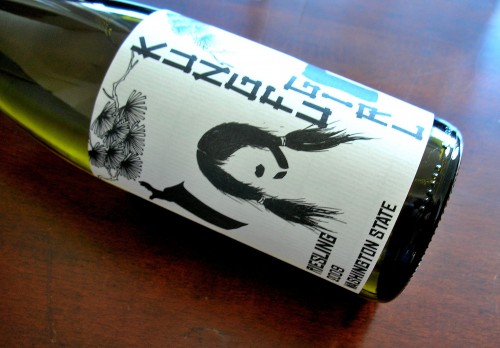
Posted: February 19th, 2012 | No Comments »
Running around from Hong Kong today so no time to write anything – anyway, here’s a picture you don’t see often of one of the old gateways into the Legation Quarter of Peking…This is a Sidney Gamble photo. More on him here.
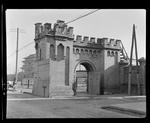
Posted: February 18th, 2012 | No Comments »

Behind the Bamboo Curtain
Sunday, February 19, 2012
2pm
Follow Simon Cockerell across the border of one of the most mysterious countries in the world: North Korea. He shares stories and photos from his frequent visits and the experiences and dealings he has had with the North Koreans. Mr. Cockerell hopesduring the afternoon to demystify some of the more confusing elements of North Korean society and in general present more information about a place about which too little is known.
Mr. Cockerell is the General Manager of Koryo Tours Ltd, the Beijing-based British-run tour company that specializes in leading tours to North Korea. He has been visiting North Korea on a regular basis since 2002.
At the Suzhou Bookworm, Gunxiu Fang 77, Shi Quan Jie. 50 rmb for members; 90 rmb for non-members. Includes one glass of wine or beer. For more information or membership applications, contact Bill Dodson at bdodson88@gmail.com.
And look forward to the first anniversary celebration of RAS-Suzhou….
Chiang Kai Shek: the Early Years
Saturday, March 17
5pm – 7pm.
Come celebrate the first anniversary of the Suzhou chapter of the Royal Asiatic Society (RAS) with a talk by Jonathan Fenby on the early life of Chiang Kai Shek, followed by a reception and membership drive hosted by the RAS. Mr Fenby is the author of a biography of Chiang Kai Shek and of “The Penguin History of Modern China: The Fall and Rise of a Great Power, 1850-2009â€. He traces the rise of Chiang from 1911 to 1937, against the backdrop of a country torn apart by feuding warlords, ruthless gangsters, greedy colonials and pugnacious political parties.
At the Suzhou Bookworm, Gunxiu Fang 77, Shi Quan Jie. Purchase of Literary Festival ticket required for entry.
Posted: February 18th, 2012 | No Comments »
Another picture of the Grand Hotel de Pekin – slightly later than yesterdays and from the photographers right rather than left. It’s such a marvellous hotel and structure it’s worth a couple of shots I feel…
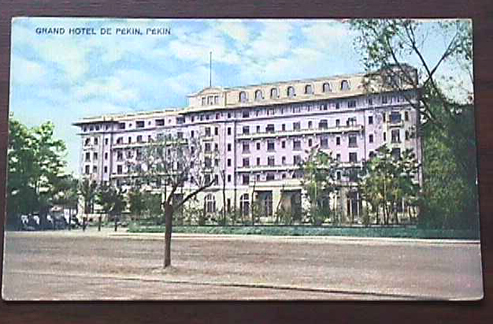
Posted: February 17th, 2012 | 1 Comment »
Here’s a postcard from 1920 of the Peking Hotel (Grand Hotel de Pekin) which, of course, still stands on the corner of Chang ‘an and Wangfujing (Morrison Street) though has been added too and mucked about a bit over the decades. Here flying the French flag too. Stand on Chang’an and you’ll see the basic structure still remains including the grand ground level entrance.
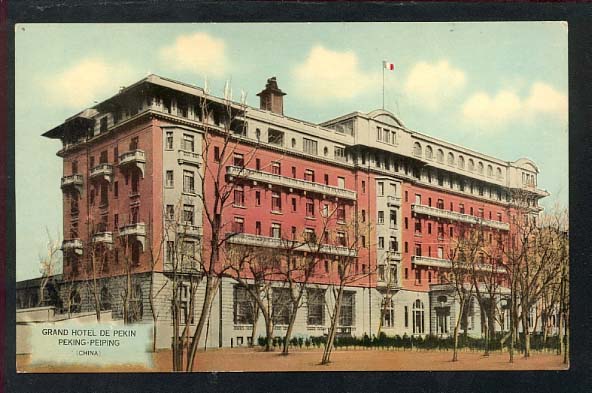
Posted: February 16th, 2012 | No Comments »
Few cities have been as important to fostering trade between China and Europe than Laurenco Marques, now better known as Maputo in Mozambique. The Portuguese developed it as a crossroads between the Orient and Europe. Laurenco Marques was himself a sixteenth century Portuguese trader who have the port his name. Ships stopped en route and then of course during the Second World War the evacuation ships from China often passed through Laurenco Marques. So perhaps not so surprising that an “Oriental Kiosk” and restaurant would be a prominent waterfront business catering to those already homesick travellers or Chinese sailors. Don’t know much else about it and obviously I think it is long gone in Maputo – but interesting all the same.
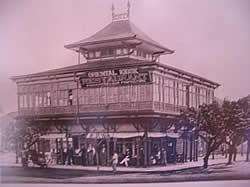
Posted: February 15th, 2012 | 1 Comment »
Doug Clarke is a lawyering type of chap, ex of this parish up in Shanghai for many years and now resident down in the former Crown Colony to the south and barristering away. He’s also found time to write a history of the foreign and mixed court system in Shanghai and China in the treaty port era. It’s forthcoming from Earnshaw Books and entitled Gunboat Justice. I’ve seen snatches and Doug has dug up some great stories and some serious analysis of the system – we await with baited breath. In the meantime, as a taster, he’s just published an essay raising some of the historical issues around the Supreme Court in Hong Kong and the treaty port courts on the website of the Hong Kong Lawyer – I realise many of you will not be regular readers of Hong Kong Lawyer, so here‘s the link!
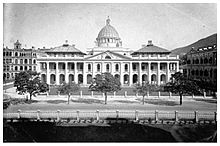
Hong Kong’s “old Supreme Court Building” facing Statue Square circa 1915
Posted: February 15th, 2012 | No Comments »
RAS LECTURE
Tuesday 21st February 2012 at 7:00 p.m.
Tavern, Radisson Plaza Xingguo Hotel 78 Xing Guo Road, Shanghai
PETER COOKSON SMITH
The Urban Design of Concession: Tradition and Transformation in the Chinese Treaty Port

The Treaty Ports were established as beachheads of foreign influence around the coast of China during the mid-nineteenth century, a period of massive Western expansionism and trading ambition. These port cities, based on enforced treaties between China and Western powers, became the centres of foreign settlement and trade in China, opening up parts of the country to Western cultural influence just as much as they expanded investment and economic horizons. In a more elusive way, the nature of these new ‘gateways’ both into and out of China, transformed not only attitudes to modernization, but almost inadvertently fuelled changing political attitudes. Foreign concession and settlement areas, which generally formed separate but planned extensions to established city structures, offered an alternative urbanism outside hidebound tradition and state control.
The Treaty Ports can be considered from a number of perspectives – initially as differentiated societies with dual administrative structures; as socio-cultural phenomena; as new political power structures; as robust centres of international trade and commercial growth; and as new regimes of city building and institutional development. In all, the treaty port period reflected a frequently unstable but inevitable transition from the old to the new China.
The talk will focus on these aspects and some of the contextual changes in the main Treaty Ports of Shanghai, Guangzhou, Fuzhou, Ningbo, Xiamen, Dalian, Harbin, Nanjing, Tientsin, Qingdou, Hankow and Shantou over the past 150 years and will be accompanied by sketch illustrations showing the imprints on the modernizing cities of older places and spaces from these early times, which have left a residue of physical traces in terms of plan forms, streets and building groups.
Dr Peter Cookson Smith is an architect, planner and urban designer. He has been resident in Hong Kong since 1977 when he founded Urbis Limited one of the first specialist planning, urban design and landscape consultancies in South-east Asia.
Over the past 35 years, he has directed a large number of studies in Hong Kong, and throughout China and other parts of Asia including new town planning, urban regeneration, central area and waterfront studies.
He writes regularly on the subject of urban design and is the author of ‘The Urban Design of Impermanence’ on Hong Kong, ‘The Urban Design of Concession’ on the Treaty Port Cities in China, and the forthcoming ‘The Urban Design of Intervention’ on Asian Cities. He was a Professor in the Department of Architecture, University of Hong Kong 2000-2004, and is a member of the HKU Advisory Council for the Department of Planning and Urban Design. He is also a Visiting Scholar at the Centre for Asian Studies, HKU. He is currently the President of the Hong Kong Institute of Planners, and Vice-President of the Hong Kong Institute of Urban Design.
Entrance: RMB 30.00 (RAS members) and RMB 80.00 (non-members) those unable to make the donation but wishing to attend may contact us for exemption, prior to the RAS Lecture. Membership applications and membership renewals will be available at this event.
RSVP: to RAS Bookings at: bookings@royalasiaticsociety.org.cn







